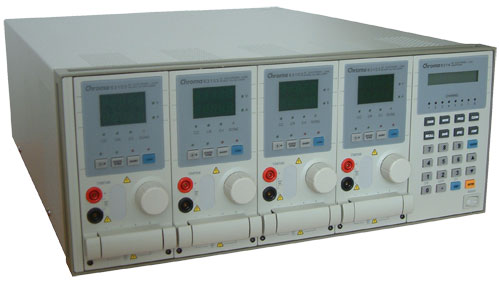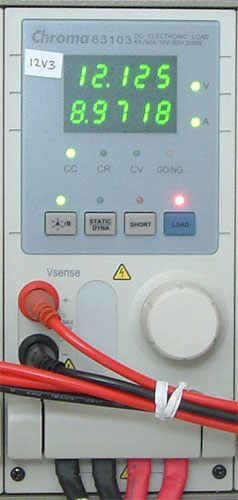AnandTech Power Supply Test Methodology
by Christoph Katzer on July 12, 2007 12:00 AM EST- Posted in
- Cases/Cooling/PSUs
Chroma Programmable DC Loads 6314

Our test equipment contains two Chroma programmable DC Loads which enable us to test power supplies with an output of up to 1500W. The biggest advantage of the Chroma DC Loads is simply the high precision it provides. It can measure differences as small as 0.001V and 0.0001Amp which will provide us with best-in-class results.
The Chroma programmable load is the heart of our equipment and controls the functions of the power supply. With it we can see the delivered voltage in response to the specific amount of load we are placing on each rail. In addition we will test security features like Over Current Protection (OCP), short circuit, and Over Power Protection (OPP).
A very important aspect in testing a power supply correctly is to put the right load on each rail. Stating that a 10% load is put on the power supply says nothing about the distribution of the load on each rail. For example, this 10% could be 80% load on the +12V1, 5% on +12V2 and +12V3, and 3% on +12V4; the rest would be on the other rails. In other words, simply giving a single all-encompassing load rating means that the load can be put on each rail differently, as long as the total load is always 10%. This is not a correct test according to the Intel Design Guide.

The guide clearly states how the percentages of loads need to be distributed on each rail, and we are working strictly according to this specification. It is not unusual to get an odd looking number since our calculations are strictly mathematical. One of these numbers can be seen in the above picture which shows a single load for the +12V3 rail. We are loading it at that moment with 8.9718 Amps which is the most accurate testing available in the market today. To make the data more accessible for our readers we will be rounding each result to the nearest hundredth, but that is still more accurate than what we see elsewhere.

Our test equipment contains two Chroma programmable DC Loads which enable us to test power supplies with an output of up to 1500W. The biggest advantage of the Chroma DC Loads is simply the high precision it provides. It can measure differences as small as 0.001V and 0.0001Amp which will provide us with best-in-class results.
The Chroma programmable load is the heart of our equipment and controls the functions of the power supply. With it we can see the delivered voltage in response to the specific amount of load we are placing on each rail. In addition we will test security features like Over Current Protection (OCP), short circuit, and Over Power Protection (OPP).
A very important aspect in testing a power supply correctly is to put the right load on each rail. Stating that a 10% load is put on the power supply says nothing about the distribution of the load on each rail. For example, this 10% could be 80% load on the +12V1, 5% on +12V2 and +12V3, and 3% on +12V4; the rest would be on the other rails. In other words, simply giving a single all-encompassing load rating means that the load can be put on each rail differently, as long as the total load is always 10%. This is not a correct test according to the Intel Design Guide.

The guide clearly states how the percentages of loads need to be distributed on each rail, and we are working strictly according to this specification. It is not unusual to get an odd looking number since our calculations are strictly mathematical. One of these numbers can be seen in the above picture which shows a single load for the +12V3 rail. We are loading it at that moment with 8.9718 Amps which is the most accurate testing available in the market today. To make the data more accessible for our readers we will be rounding each result to the nearest hundredth, but that is still more accurate than what we see elsewhere.










49 Comments
View All Comments
Adul - Thursday, July 12, 2007 - link
I'd love to see a power supply catch fire :). Maybe one of the cheaper ones will break enough for this.CrystalBay - Thursday, July 12, 2007 - link
I would also like to see a short video of substandard PSU's lighting up...I'm sure many enthusiasts have had Dram's start flaming or smoke. But I have never had a PSU actually catch flame out....
Martimus - Thursday, July 12, 2007 - link
I had a Antec NeoPower PSU spew black smoke. It was not fun. Also fried my motherboard. It was less than 6 months old too, and I wasn't using it at anywhere near it's supposed capacity.BladeVenom - Thursday, July 12, 2007 - link
Then test power supplies that are in the range that most people actually need. Also test some budget ones. Let's see which ones are good for the money, and which ones are fire hazards.
xsilver - Thursday, July 12, 2007 - link
what is meant is that the idea of having a psu is NOT to load it to 100% capacity.and the problem being that it is very difficult to get a stable and repeatable psu testing setup.
I highly recommend that industrial manufacturers be pointed out just like in xbit labs reviews. That way we will know that antec has 3 or more suppliers providing psu's and be able to tell the seasonics from the other crud ;)
Wesleyrpg - Thursday, July 12, 2007 - link
hmm i wonder if thats why some people rave about Antec and some people like me curse them! I'd have to say Antec have the worst failure rate by far, probably at about 75% in the first year, where i can buy a $22 550W Generic (Honli) and only have about a 25% failure rate, maybe thats related to the power supplys released into australia by antec.imaheadcase - Thursday, July 12, 2007 - link
I kid! :Pgersson - Thursday, July 12, 2007 - link
just a red 'X'gersson - Thursday, July 12, 2007 - link
nevermind -- working already :-)